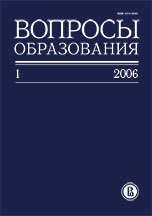Наиболее читаемые статьи этого автора (авторов)
- Яна Рощина, Дифференциация доходов и образования в России , Вопросы образования / Educational Studies Moscow: № 4 (2005)
- Яна Рощина, Оксана Черненко, Региональные и муниципальные модели социальной политики в сфере среднего общего образования (часть 2) , Вопросы образования / Educational Studies Moscow: № 2 (2007)
- Давид Константиновский, Дмитрий Куракин, Яна Рощина, Виктор Вахштайн, Доступность качественного общего образования в России: возможности и ограничения , Вопросы образования / Educational Studies Moscow: № 2 (2006)
- Яна Рощина, Оксана Черненко, Региональные и муниципальные модели социальной политики (часть 1) , Вопросы образования / Educational Studies Moscow: № 1 (2007)
- Яна Рощина, Мария Юдкевич, Факторы исследовательской деятельности преподавателей вузов: политика администрации, контрактная неполнота или влияние среды? , Вопросы образования / Educational Studies Moscow: № 3 (2009)
- Яна Рощина, Семейный капитал как фактор образовательных возможностей российских школьников , Вопросы образования / Educational Studies Moscow: № 1 (2012)
- Яна Рощина, Сергей Рощин, Виктор Рудаков, Спрос на массовые открытые онлайн-курсы (MOOC): опыт российского образования , Вопросы образования / Educational Studies Moscow: № 1 (2018)








